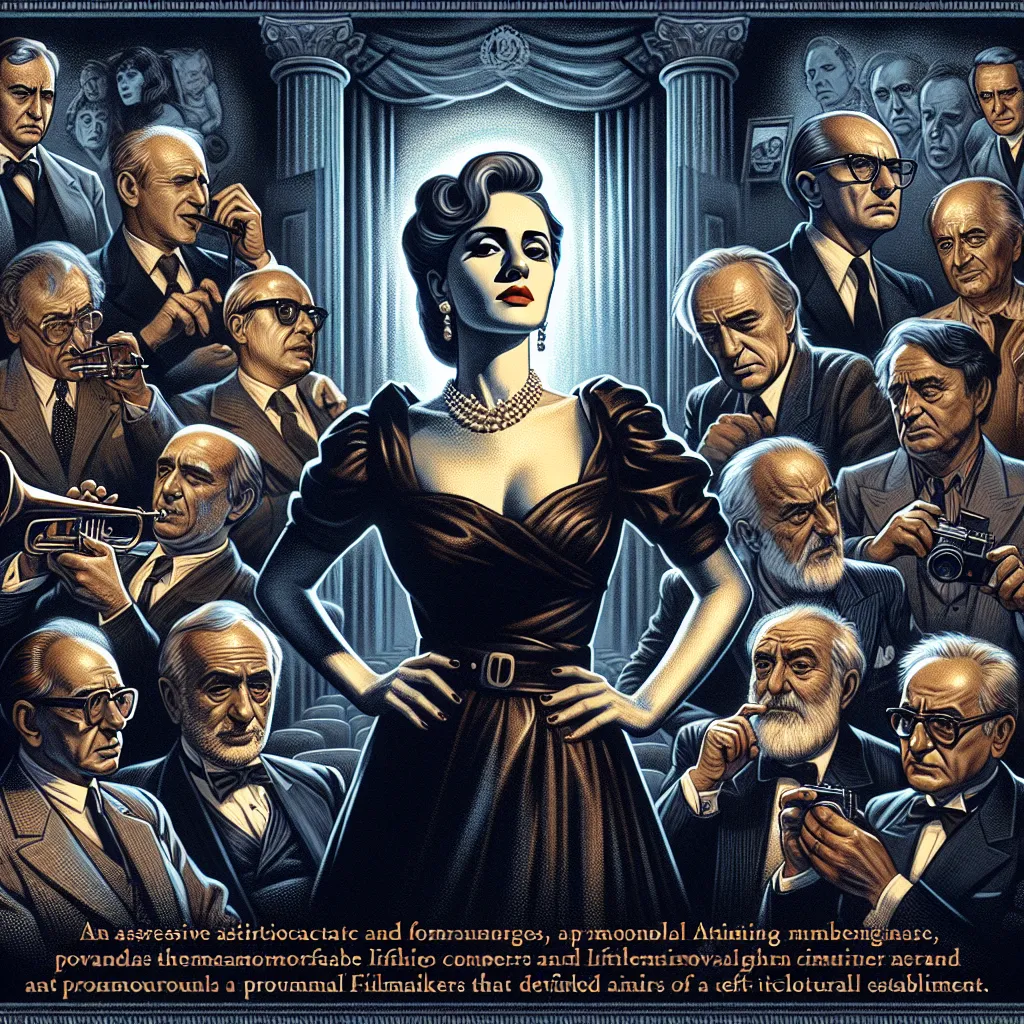Countess Marina Cicogna has died, Italy's first female Oscar-winning producer to bring Sweet Life to life.

The 89-year-old Countess Marina Cicogna, who was able to stand up to geniuses such as Pier Paolo Pasolini and earned the respect of Italy's leftist cultural elite despite her noble origins from a count family, has passed away.
She was the first Italian woman to produce major films, including Sergio Leone's 1968 epic Once Upon a Time in the West (co-written with her brother Bino) and 1970's frank Italian satire on corruption, Investigation of a Citizen Under Suspicion, starring her beloved Brazilian actress Florinda Bolkan, which won an Oscar for Best Foreign Language Film.
Confident and passionate, with a royal' 'At ease, she defended her position against unruly geniuses such as Pasolini, whom she convinced to choose Terence Stamp to play the title role in Theorema (1968), and managed to earn the respect of the Italian cultural left by not embracing champagne socialism (unlike her Orientalist nobleman Luchino Visconti) and never pretending to be something she wasn't.
Countess Marina Cicogna Mozzoni Volpi di Misurata
was born on May 29, 1934, at the Palazzo Volpi in Rome. She was the daughter of Count Cesare Cicogna Mozzoni, a Milanese banker and descendant of the Doge of Venice, and his wife Anna Maria, a friend of Cecil Beaton and Nancy Mitford, who dedicated the novel Don't Tell Alfred to her. During the Venice festivals, the young Marina' 'made new famous friends (such as Marilyn Monroe, Lauren Becall and Rock Hudson) along with those she knew through her family in Venice (not only Beaton and Nancy Mitford, but also Audrey Hepburn, David Niven, Princess Margaret and Lord Snowdon).
She then took some Hollywood friends with her to Tripoli in Libya, where her family still owned a resort, and befriended one of Colonel Gaddafi's sons; she later helped him throw a party in Venice, of which she told The New York Times that it was "horrible. I've never seen people buying up money in such a horrible way, hiring yachts with prostitutes and things like that." She vacationed on Aristotle Onassis' yacht with Winston Churchill and Greta Garbo, who turned out to be nothing like their fame:' 'Churchill quiet and withdrawn, Greta Garbo wanting to enjoy life and go ashore.
In 1966, her mother bought Euro International Films, an Italian film studio that specialized in foreign films. Marina Cicogna, then 32 years old, and her brother Giuseppe Ascanio, known as Bino, began selecting films for distribution. Wasting no time, she chose the counter-versus-documentary "Helga," showing a woman giving birth. "We put an ambulance outside the theater exit, we thought people would faint when they saw it," she said. The screening of the movie proved to be a huge success.
A year later, three films represented by the brothers were in competition at the Venice Film Festival: Pasolini's "Oedipus Rex," Visconti's "The Outsider" and'
'Luis Buñuel's movie "Belle of the Day" with Catherine Deneuve. Marina Cicogna organized the party, sending a Learjet to Corsica to pick up Elizabeth Taylor and Richard Burton, and another to Rome to pick up Jane Fonda and Roger Vadim. (After the 1968 protests, however, as she recalled, "you couldn't have big parties without hurting someone's feelings, you couldn't drive a Rolls-Royce without having eggs thrown at you.")
The Chiconians decided to start financing and producing movies on their own. In 1968, they spent $2 million dollars to make Once Upon a Time in a Trap, a sublimation of the spaghetti western era, starring Claudia Cardinale and Henry Fonda, with music by Ennio Morricone. That same year they also made 'Young Tigers' with Helmut Berger and 'Theorem''
'Pasolini. In 1969, she financed Pasolini again, this time for the movie "Medea" with Maria Callas.
her mother bought Euro International Films, an Italian film studio that specialized in foreign films. Marina Cicogna, then 32 years old, and her brother Giuseppe Ascanio, known as Bino, began selecting films for distribution. Wasting no time, she chose the counter-versus-documentary "Helga," showing a woman giving birth. "We put an ambulance outside the theater exit, we thought people would faint when they saw it," she said. The screening of the movie proved to be a huge success.
A year later, three films represented by the brothers were in competition at the Venice Film Festival: Pasolini's "Oedipus Rex," Visconti's "The Outsider" and' 'Luis Buñuel's movie "Belle of the Day" with Catherine Deneuve. Marina Cicogna organized the party, sending a Learjet to Corsica to pick up Elizabeth Taylor and Richard Burton, and another to Rome to pick up Jane Fonda and Roger Vadim. (After the 1968 protests, however, as she recalled, "you couldn't have big parties without hurting someone's feelings, you couldn't drive a Rolls-Royce without having eggs thrown at you.")
The Chiconians decided to start financing and producing movies on their own. In 1968, they spent $2 million dollars to make Once Upon a Time in a Trap, a sublimation of the spaghetti western era, starring Claudia Cardinale and Henry Fonda, with music by Ennio Morricone. That same year they also made 'Young Tigers' with Helmut Berger and 'Theorem'' 'Pasolini. In 1969, she financed Pasolini again, this time for the movie "Medea" with Maria Callas.
The only movie she stood up to her family was Let's Say It's One Night for Dinner (1969), but it was a critical success and was her first collaboration with Brazilian model-actress Florinda Bolkan, who then starred in their Oscar-winning film Investigation of a Citizen Under Suspicion the following year.
For a while, it looked like the brothers could combine everything. When Warren Beatty came to Rome to promote Bonnie and Clyde, he called Marina Cicogna: "I hear you're a genius, and you're young and good looking. We should get together." They had plans for a joint' 'producing a movie starring Trevor Howard and a big-budget movie about the Battle of Midway.
The illusion of a limitless family fortune that had sustained her charmed life was rudely shattered when the more fragile Beano, in her words, "went crazy." He plunged into debt, became a drug addict, left for Rio de Janeiro to start a new life, and then committed suicide at age 36 in 1971. Meanwhile, Marina began a relationship with Florinda Bolkan: "Efebic, sensual, she didn't look like everyone else." She also had affairs with Alain Delon and Lex Barker, the actor who played Tarzan. (As Marina recounted, industrialist-player Gianni Agnelli, out of jealousy, burst in on her and Barker with a picture lamp, lifted up a sheet and asked:' ' 'Can you show me this Tarzan? It's not bad, though.") But she hasn't embraced labeling herself as gay or bisexual: "I've never liked to sensationalize my sexuality. I think parades and generally showing my orientation is something unnecessary. "
Marina Cicogna and Florinda Bolkan
were together for 20 years, moving between Rome, Rio de Janeiro, Los Angeles and New York, crossing paths with Jacqueline Kennedy Onassis, Andy Warhol, David Hockney and Paloma Picasso. Marina Cicogna went on to produce The Proletarian Goes to Paradise, which won the Palme d'Or in 1971, Lina Wertmüller's comedy The Seduction of Mimi (1972), Michele Lupo's The Man Who Clutches (1972) and Franco Zeffirelli's Brother Sun, Sister Moon, nominated for an Oscar in 1974,' 'but she became disillusioned with the Italian movie industry in the late 1970s.
In the early 1990s, she separated from Florinda Bolkan, who often cheated on her but could not stand any infidelity on Marina Cicogna's part, with her new lover Benedetta Gardona, who was 25 years younger and whom she once had to hide in a closet to hide from Florinda Bolkan. Marina Cicogna stayed with Benedetta Gardona, whom she adopted for inheritance purposes, until she passed away.
Slim and stylish and attracted the attention of fashion designers, she drank little, didn't smoke, and at 50 gave up fried food, butter, meat and béchamel sauce. Having been on the slopes of Cortina as a child, she skied until her final years' 'life.
She had no patience for fools, but distinguished herself by her curiosity and interest in talent, trying to find it by searching in her car in dozens of small theaters on the outskirts of Rome even in her seventies.
She served as president of the Italian Film Institute and helped found the Iski Film Festival. In 2009, she had an exhibition of her photographs from the sixties jet set in London and went on to publish three picture books. In 2021, a documentary about her, "Marina Chikonya: The Producer," was released.
Countess Marina Ciconha, born May 29, 1934, died on November 4, 2023.
Tags
We will find property in USA for you
- 🔸 Reliable new buildings and ready-made apartments
- 🔸 Without commissions and intermediaries
- 🔸 Online display and remote transaction
Our managers will help you choose a property
Liliya
International Real Estate Consultant

Subscribe to the newsletter from Hatamatata.com!
Subscribe to the newsletter from Hatamatata.com!
Popular Posts
We will find property in USA for you
- 🔸 Reliable new buildings and ready-made apartments
- 🔸 Without commissions and intermediaries
- 🔸 Online display and remote transaction
Our managers will help you choose a property
Liliya
International Real Estate Consultant

Subscribe to the newsletter from Hatamatata.com!
Subscribe to the newsletter from Hatamatata.com!
I agree to the processing of personal data and confidentiality rules of Hatamatata
Popular Offers



Need advice on your situation?
Get a free consultation on purchasing real estate overseas. We’ll discuss your goals, suggest the best strategies and countries, and explain how to complete the purchase step by step. You’ll get clear answers to all your questions about buying, investing, and relocating abroad.


Irina Nikolaeva
Sales Director, HataMatata






